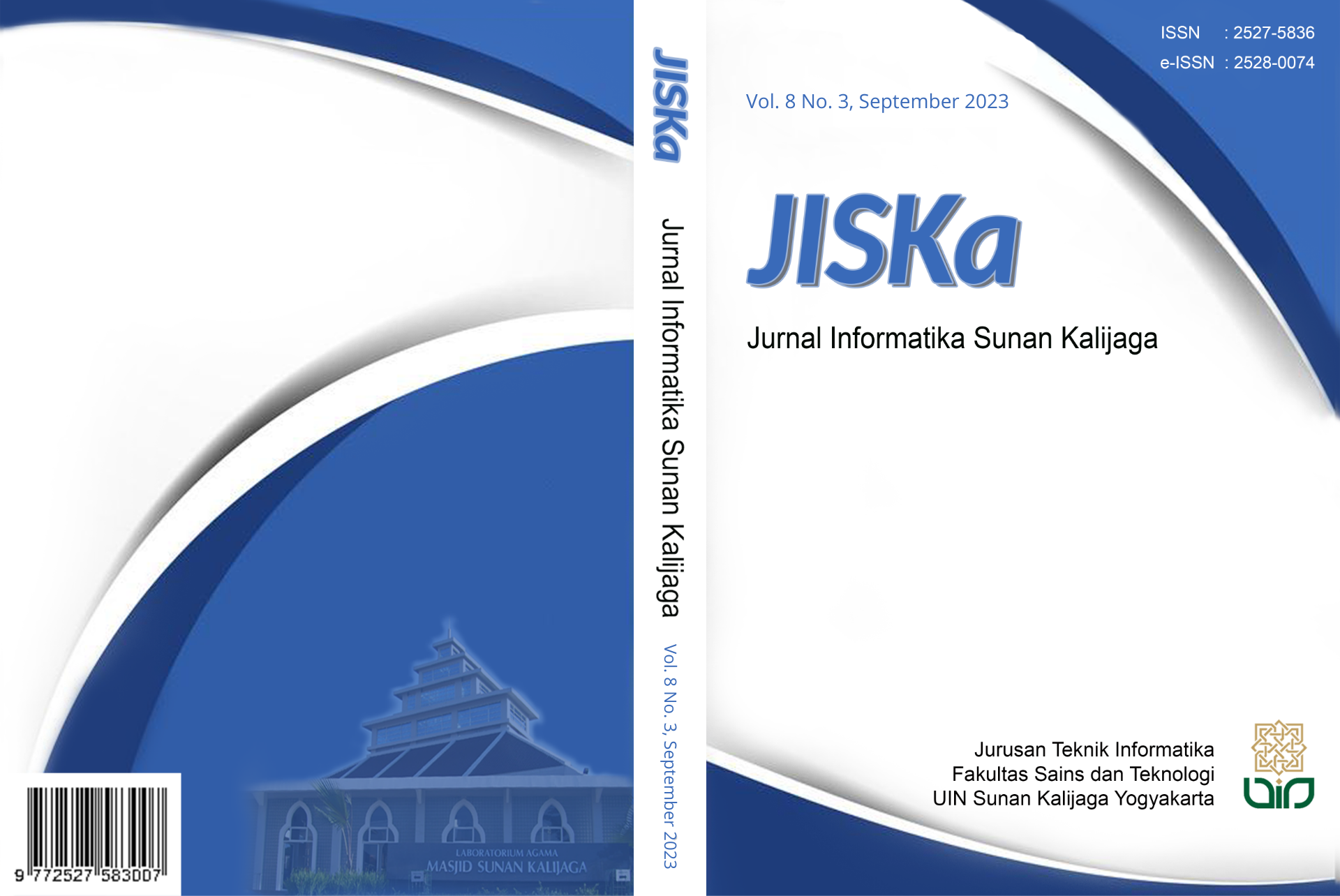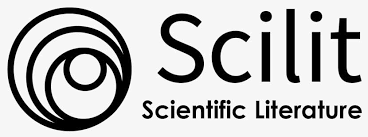Analisis Bibliometrik Publikasi Isu Kebocoran Data Menggunakan VOSviewer
DOI:
https://doi.org/10.14421/jiska.2023.8.3.231-242Keywords:
Bibliometrics Analysis, Data Leakage, Data Privacy, VOSviewer, Scientific PublicationAbstract
Data leakage can harm individuals who experience it, such as identity theft, financial fraud, or even physical security threats. This study aims to analyze scientific publications and research activities in data leakage using bibliometric techniques by involving quantitative analysis using a set of journals as reference sources. The literature for this study was obtained using Publish or Perish software with the keyword "data leakage" and a search result limit of 500. Furthermore, from these results, 85 journals relevant to the research topic were selected for visualization using VOSviewer software. The results showed that the highest number of data leakage publications occurred in 2021, namely 30 journals published that year. Based on the results of the bibliometric analysis conducted, it is known that there are 9 clusters based on keywords and 19 clusters based on author. The most frequently researched keywords include personal data, privacy, data leakage, legal protection, security, cryptography, encryption, and description. On the other hand, some keywords are rarely discussed in publications, namely, air transportation, electronics, and Caesar.
References
Aprilia, M. P., & Nandiyanto, A. B. D. (2022). Analisis Bibliometrik Penelitian Pengaruh Edible Coating Nanopartikel Kitosan Terhadap Masa Simpan Buah Tomat Menggunakan VOSviewer. Fraction: Jurnal Teori Dan Terapan Matematika, 2(2), 38–45. https://doi.org/10.33019/fraction.v2i2.29
Baneyx, A. (2008). “Publish or Perish” as citation metrics used to analyze scientific output in the humanities: International case studies in economics, geography, social sciences, philosophy, and history. Archivum Immunologiae et Therapiae Experimentalis, 56(6), 363–371. https://doi.org/10.1007/s00005-008-0043-0
Firmansyah Putri, D. D., & Fahrozi, M. H. (2021). Upaya Pencegahan Kebocoran Data Konsumen Melalui Pengesahan RUU Perlindungan Data Pribadi (Studi Kasus E-Commerce Bhinneka.Com). Borneo Law Review, 5(1), 46–68. https://doi.org/10.35334/bolrev.v5i1.2014
Husaeni, D. N. Al, & Nandiyanto, A. B. D. (2023). Bibliometric Analysis of High School Keyword Using VOSviewer Indexed by Google Scholar. Indonesian Journal of Educational Research and Technology, 3(1), 1–12. https://doi.org/10.17509/IJERT.V3I1.43112
Kurnianingrum, T. P. (2023). Urgensi Pelindungan Data Pribadi Konsumen di Era Ekonomi Digital. Kajian, 25(3), 197–216. https://doi.org/10.22212/KAJIAN.V25I3.3893
Nugroho, I. I., Pratiwi, R., & Az Zahro, S. R. (2021). Optimalisasi Penanggulangan Kebocoran Data Melalui Regulatory Blockchain Guna Mewujudkan Keamanan Siber di Indonesia. Ikatan Penulis Mahasiswa Hukum Indonesia Law Journal, 1(2), 115–129. https://doi.org/10.15294/ipmhi.v1i2.53698
Hudha, M. N., Hamidah, I., Permanasari, A., Abdullah, A. G., Rachman, I., & Matsumoto, T. (2020). Low Carbon Education: A Review and Bibliometric Analysis. European Journal of Educational Research, 9(1), 319–329. https://doi.org/10.12973/eu-jer.9.1.319
Nurfauzan, M. iqbal, & Faizatunnisa, H. (2021). Analisis Bibliometrik Trend Penelitian Covid-19 di Indonesia Pada Bidang Bisnis dan Manajemen. JURNAL BISNIS STRATEGI, 30(2), 90–100. https://doi.org/10.14710/jbs.30.2.90-100
Oktaviani, S., Dewata, Y. J., & Fadlian, A. (2021). Pertanggung Jawaban Pidana Kebocoran Data BPJS dalam Perspektif UU ITE. De Juncto Delicti: Journal of Law, 1(2), 146–157. https://doi.org/10.35706/DJD.V1I2.5732
Pattah, S. H. (2013). Pemanfaatan Kajian Bibliometrika sebagai Metode Evaluasi dan Kajian dalam Ilmu Perpustakaan dan Informasi. Khizanah Al-Hikmah : Jurnal Ilmu Perpustakaan, Informasi, Dan Kearsipan, 1(1), 47–57. https://journal.uin-alauddin.ac.id/index.php/khizanah-al-hikmah/article/view/25
Pertiwi, E., Nuraldini, D. D., Buana, G. T., & Arthacerses, A. (2022). Analisis Yuridis Terhadap Penyalahgunaan Data Pribadi Pengguna Media Sosial. Jurnal Rechten : Riset Hukum Dan Hak Asasi Manusia, 3(3), 10–16. https://doi.org/10.52005/rechten.v3i3.65
Perwitasari, D. A., Candradewi, S. F., Solikhah, Irham, L. M., & Purba, F. D. (2022). Analisis Bibliometrik Pada Kualitas Hidup Pasien Kanker Payudara Menggunakan EORTC: 1993-2021. Medical Sains : Jurnal Ilmiah Kefarmasian, 7(1), 29–38. https://doi.org/10.37874/ms.v7i1.304
Susanti, L., Tania, L., Komala, H. W., & Meiden, C. (2022). Pemetaan Bibliometrik terhadap Social Theory pada Bidang Akuntansi Menggunakan VOSviewer. Jurnal Ekobistek, 11(4), 272–277. https://doi.org/10.35134/ekobistek.v11i4.393
van Eck, N. J., & Waltman, L. (2010). Software survey: VOSviewer, a computer program for bibliometric mapping. Scientometrics, 84(2), 523–538. https://doi.org/10.1007/s11192-009-0146-3
Yudistira, M., & Ramadani, R. (2023). Tinjauan Yuridis Terhadap Efektivitas Penanganan Kejahatan Siber Terkait Pencurian Data Pribadi Menurut Undang-Undang No. 27 Tahun 2022 oleh KOMINFO. UNES Law Review, 5(4), 3917–3929. https://doi.org/10.31933/UNESREV.V5I4.698
Downloads
Published
How to Cite
Issue
Section
License
Copyright (c) 2023 Hanissa Rizki Kurnia, Aisyah Zahrah, Elvia Ichsazene Dina Adha, Nur Aini Rakhmawati

This work is licensed under a Creative Commons Attribution-NonCommercial 4.0 International License.
Authors who publish with this journal agree to the following terms as stated in http://creativecommons.org/licenses/by-nc/4.0
a. Authors retain copyright and grant the journal right of first publication with the work simultaneously licensed under a Creative Commons Attribution License that allows others to share the work with an acknowledgement of the work's authorship and initial publication in this journal.
b. Authors are able to enter into separate, additional contractual arrangements for the non-exclusive distribution of the journal's published version of the work (e.g., post it to an institutional repository or publish it in a book), with an acknowledgement of its initial publication in this journal.
c. Authors are permitted and encouraged to post their work online (e.g., in institutional repositories or on their website) prior to and during the submission process, as it can lead to productive exchanges, as well as earlier and greater citation of published work.










